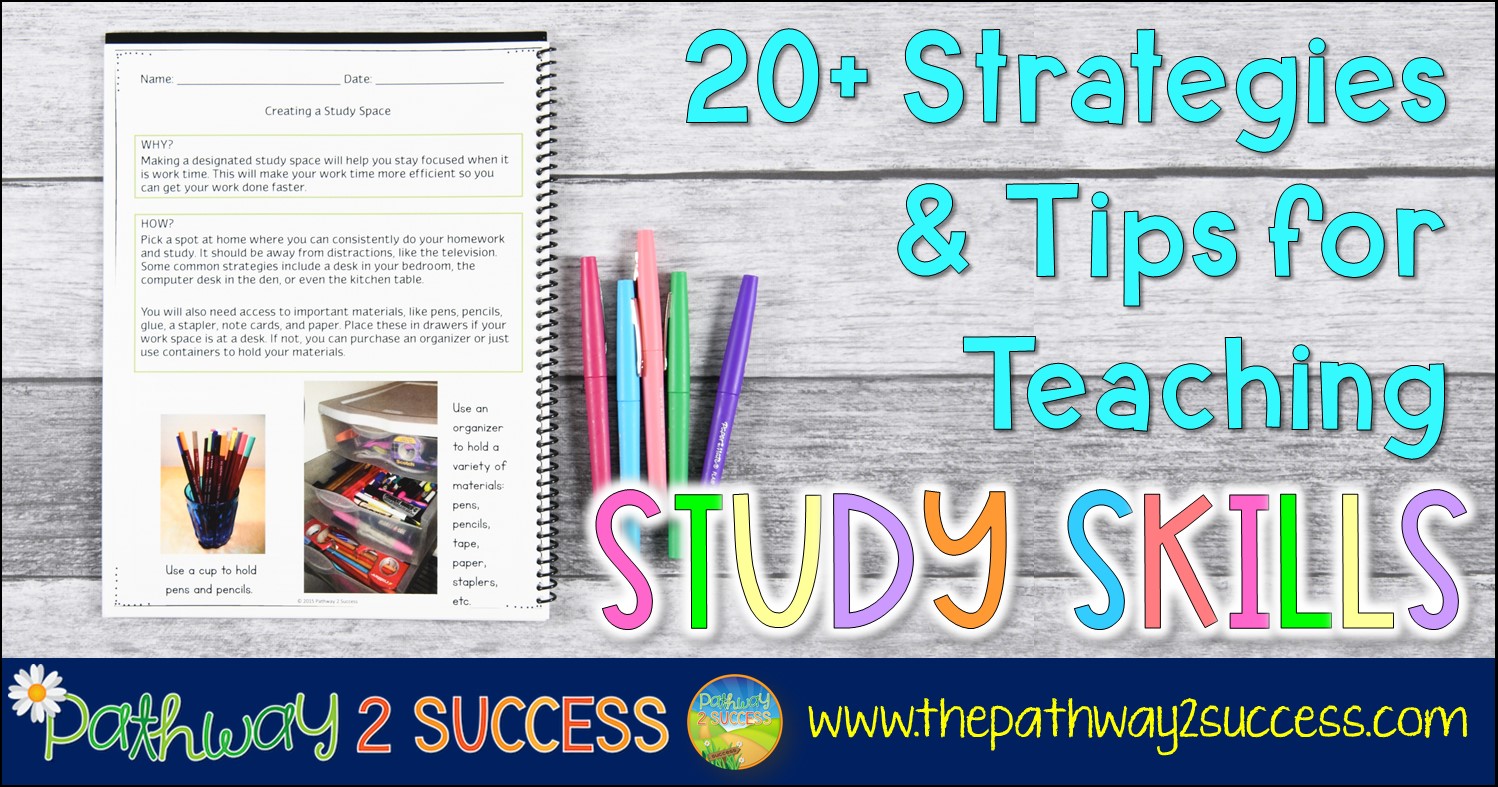
Good study habits and techniques are critical to
If you notice some of your students are struggling with basic study skills and habits, make time to address and teach the skills. You can choose to dedicate time during morning meeting, resource room, or even a separate study skills class. Whatever you choose, make a schedule and stick with it. Teaching these skills early on is important for help all learners do their best. I’ve put together a list of ideas and resources, but check out this yearlong Executive Functioning and Study Skills activities set if you want to get started on teaching these skills right away.
Here are some simple tips, tricks, and strategies you can use to help students develop study skills in your classroom:
Build relationships first. Simply put, learning new study strategies can be tough for kids and young adults. It’s always worth spending extra time early on to develop strong relationships. Not only will this help you to get to know your students, but it will help them to persevere and succeed in your class. Use these strategies to focus on building relationships with your learners.
Know your learners. Before getting started on teaching study skills, assess what your students know first. One helpful place to start is using this free Study Skills Checklist. It can be a great tool to help students develop self-awareness about their skills, while also giving you critical data on what you need to teach.

Teach how to study for tests and quizzes. Spend time teaching a variety of different study strategies for success: taking notes, quizzing yourself, making flashcards, having a partner quiz you, re-doing problems, and more. Different strategies are going to work for different learners, so it’s important that all students are exposed to several activities.

Practice studying just to learn. Sometimes students think that studying is only important when a test or quiz is coming up. Instead, help kids embrace the idea that studying is part of the learning process. Studying just to learn can help reduce the amount of time students will have to study when a test or quiz comes up, and it helps them to learn the material better in the first place.
Practice study skills with

Teach about the power of habits and routines. Students can benefit greatly from understanding how important our habits are. Spend time discussing and highlighting some current habits students already have (brushing their teeth in the morning or cleaning up their trays after lunch). These tasks are much easier when they just become part of our everyday routines. This can eventually encourage students to develop habits for writing homework down, organizing their binders, and studying for tests.
Teach executive functioning skills. Study skills are inherently linked with executive functioning skills. Students can benefit greatly from improving skills with planning, organization, self-control, attention, flexibility, perseverance, and more. Most importantly, teach students that they can often improve these skills over time with practice and hard work. If you could use more background knowledge on these skills, catch up on a basic understanding of executive functioning skills in this blog post.

Teach time management. Understanding how to manage time well is a powerful skill. Teach about understanding time by having students estimate how long a task will take (such as doing 10 jumping jacks or walking to get a drink and back). Then, have students actually perform the task and check how close their estimate was. You can easily relate this back to having students consider how long tasks will take by thinking about what they have to do and then reflecting on their progress along the way. Read more about strategies and interventions for time management skills.

Discuss what it means to prioritize. Prioritizing is the ability to determine which order tasks should be completed

Practice making
Teach organization. One of the most important study skills is learning how to be organized. Spend time explicitly teaching learners how to organize materials, schedules, and projects. If you are interested specifically in organization, use this Organization Boot Camp to help get kids’ organization skills in shape. You can also start with this free organization activity to get going right away.

Revisit

Set up a homework binder (or folder). One helpful strategy for many learners is setting up a homework folder or binder that goes everywhere with them. This folder contains all current homework that needs to be done or needs to be turned in. Simply label a folder “Done” and “To Do” on each side. This is an especially helpful tip for students who lose or misplace assignments. Use this free homework binder to get your students started.
Teach how to write homework down. I know this example sounds silly, but many learners don’t know how to write homework down in an organized and consistent way. Practice what it means to write homework down accurately and explain why it is important. Doing daily or weekly homework log checks are helpful, too.

Find study buddies. No matter the age, all students should have one or two classmates to reach out to for support with homework and studying. This is a critical skill that helps build independence. When a student isn’t sure what page the homework was or didn’t understand the math lesson, it can be a good option to reach out to a classmate instead of always depending on the adults.
Teach goal-setting. All students should learn how to create action-oriented plans to reach their individual goals. This is a study skill, but also a life skill! Help students brainstorm and come up with one or two SMART goals that they want to accomplish in a short time-frame. Then, revisit those goals on a regular basis to make sure progress is being made.
Play games. Learning and improving study skills can be tough for learners. With this, games are always a helpful strategy to sneak in more learning opportunities. You can actually play any game while practicing study strategies. Just put questions for an upcoming test or quiz on flashcards. Each time a student takes a turn, they need to pick up a card and answer! If you’re looking for something more, I developed an Executive Functioning Challenge Game that students can play again and again to practice their skills.

Chunk projects and long-term assignments. Long-term assignments can be particularly overwhelming for kids and young adults. Teach students how to break them apart into smaller and more manageable chunks. Giving mini-deadlines along the way also helps students stay on track.
Teach stress management. Simply put, school is stressful for kids and young adults. It’s critical to help students learn coping strategies to help them deal with their feelings in more healthy ways. Spend some time discussing how to exercise, journal, read, practice mindfulness, and more. Grab this free list with 100 coping strategies to give you even more ideas.

Help students develop a study space. Every student should have a designated study space at home and at school to help them accomplish homework and assignments. While these study spaces might look different for every learner, having this area can help keep students organized and consistent.

Have a daily check-in and check-out. Spend just 5-10 minutes at the beginning of each day to help students get organized, check to see if they have what they need, and make a plan for the day. Do the same in the afternoon to make sure students have a plan for homework and studying after school. The goal is for students to check-in with themselves on their own, but this needs to be taught and practiced to make that happen
Practice taking brain breaks. All students need a mental break from time to time. Encourage students to check-in with themselves and notice when they need one of themselves. Practice different types of brain breaks, from exercising to practicing mindfulness. Use these free mindfulness coloring pages to have a brain break that is ready to go.

Engage in class discussions. Part of learning how to study well is problem-solving when challenges come up. Encourage students to talk through issues and brainstorm solutions together. For example, ask students what they might do when they have a lot of homework but also have

Practice the art of memorization. Sometimes studying involves memorizing certain dates or vocabulary words. These are skills that can be taught, practiced, and strengthened over time. Have fun teaching this skill by memorizing lists, lyrics, numbers, and more.
If you find yourself in need








thank you i hope this is helpful